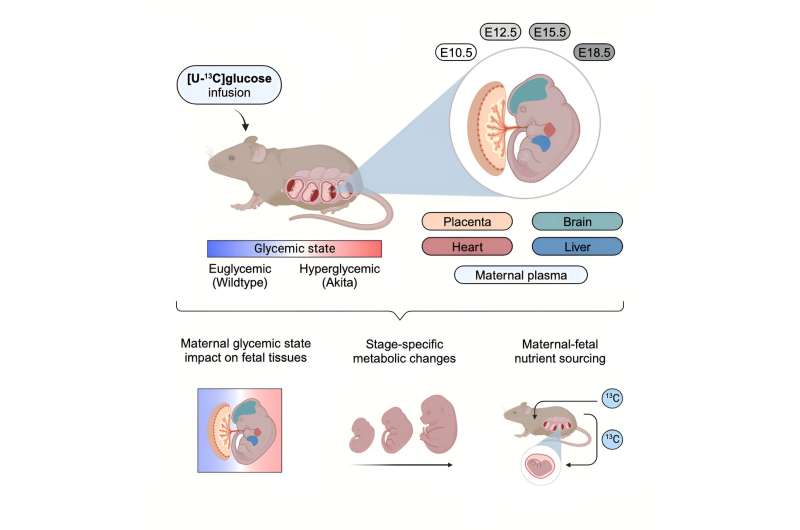
UCLA scientists examined how exposure to higher levels of glucose alter fetal tissue metabolism, using a technique they pioneered to trace in utero carbon-13 in fetal tissues. Their paper, “Atlas of Fetal Metabolism During Mid-to-Late Gestation and Diabetic Pregnancy,” published in Cell, reveals the impact of maternal hyperglycemia on fetal tissues.
If left unchecked, pregnant women with diabetes are more likely to face preterm birth and stillbirth—and they’re also more likely to deliver babies with congenital defects of the brain and heart. For example, diabetic mothers are five times more likely to give birth to a baby with cardiovascular defects. To date, we do not know exactly why this happens.
Today, UCLA scientists published a foundational study that opens the door to understanding how high levels of maternal blood glucose alter the metabolism of the fetus as it develops in utero.
Using a mouse research model that mimics diabetic pregnancies, the UCLA team examined how exposure to higher levels of glucose altered fetal tissue metabolism. For this study, researchers pioneered the technique of in-utero carbon-13 tracing in fetal tissues.
During mid-to-late gestation, they measured metabolites and metabolic activities in the placenta as well as in the fetal brain, heart and liver. Researchers targeted the most common metabolites for analyses and also conducted a broader, untargeted metabolomic analysis of metabolites that showed the greatest change in the course of development.
This research establishes a foundation for studying diabetic pregnancies and fetal health in utero, during mid-to-late-stage gestation, when vital organs are forming. The researchers show how metabolic profiles change as fetal organs develop in utero and how metabolic activity is altered in the fetuses of diabetic mothers.
Their study has resulted in a wealth of data available for other researchers to mine, providing a useful resource for future studies of fetal metabolism, especially in the context of diabetes. These findings open the possibility for research to identify specific treatments so that diabetic mothers have a better chance of delivering healthy babies.
More information:
Cesar A. Perez-Ramirez et al, Atlas of fetal metabolism during mid-to-late gestation and diabetic pregnancy, Cell (2023). DOI: 10.1016/j.cell.2023.11.011
Cell
University of California, Los Angeles
Citation:
Researchers lay groundwork to study effects of maternal diabetes on fetal metabolism and development (2023, December 8)
retrieved 10 January 2024
from https://medicalxpress.com/news/2023-12-lay-groundwork-effects-maternal-diabetes.html
This document is subject to copyright. Apart from any fair dealing for the purpose of private study or research, no
part may be reproduced without the written permission. The content is provided for information purposes only.
_______
Source : medicalxpress.com